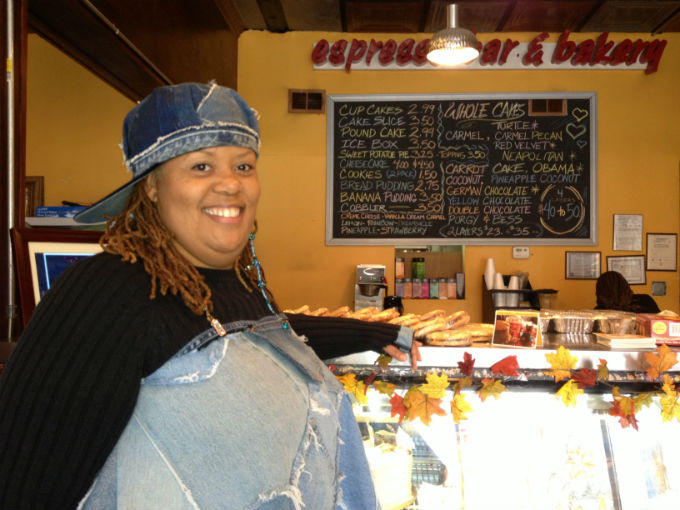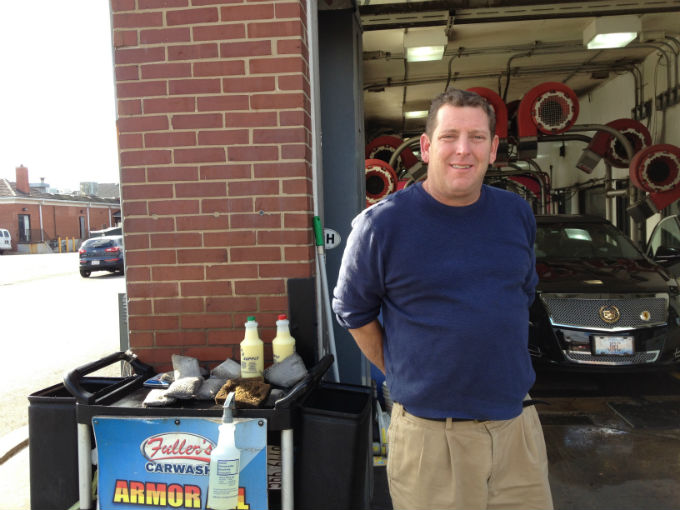Talking business, not politics with Chicago small business owners
By Niala Boodhoo

Talking business, not politics with Chicago small business owners
By Niala BoodhooWe’ve all heard every politician, from the mayor to the President, extol the virtues of small businesses. But actually talk to small businesses, and many feel it’s just lip service.
Just before this election, WBEZ visited three small businesses across the city – from a factory to a bakery, from the South Side to the suburbs – to find out what they really care about. In the end we talked mostly business, not politics.
TELCO MACHINING
PORTAGE PARK

This machine shop in Portage Park is a big, warehouse-sized room, with large machines run by a handful of operators. Ajay David’s family owns this company – Telco Machine and Manufacturing. He’s a little cynical about how often politicians talk about small businesses.
“It’s always the catch word for politics: ‘Small busineses drive the economy’,” said David, whose father started this company almost thirty years ago when he came here from India.
Telco makes precision parts, like small steel components that would make up a conveyor belt.
Over those three decades, the Davids have basically kept the same workers, most Polish immigrants. They hired them as single men. Now, they’re older with families. Which means Telco’s health insurance bill has shot up.
“Nobody really talks about health care in terms of how it affects small businesses. They talk about it on the whole,” David said, adding the company isn’t required to provide health care, but chooses to, because it’s a smart business decision. The problem is that it’s becoming less and less affordable.
In three years, the company’s health insurance premium doubled, from $35,000 to $70,000 a year.
David was hoping to get relief from the Affordable Health Care act, which does offer a credit to small businesses.
But it turns out it’s not that simple.
“We would have to do restructuring,” he said. “It goes by how much our guys make, and for our shop, it hasn’t kicked in yet. They make it seem very, very simple, like, “if you’re a small business, and you offer health care, you’ll get a tax break’.”
David said health insurance costs have weighed heavily, so much so they’ve cut back on costs they can control, like their tooling equipment.
Telco uses CNC – computerized numerical control equipment to make their parts. They work fine, but they’re pretty dated. And they’re not likely to get upgraded anytime soon.
“We’ve gone lean, that’s the term everyone likes to use,” said David, adding that he usually thinks of “lean” as meaning to fire people. “Lean for us is we’ve cut back on tooling, we’ve been recycling, reusing.”
That’s despite the fact that they’re not half as busy. In fact, business is steady.
BROWN SUGAR BAKERY
GREATER GRAND CROSSING

If Telco Machining is a small business, Stephanie Hart’s bakery is a very small business. She owns Brown Sugar Bakery on 75th and Prairie in Greater Grand Crossing.
“I am a baker, not a pastry chef,” said Hart, who has a mural that reads “Baking is Love” in orange, swirly letters on one of her storefront windows.
“Pound cakes and cobblers and pies…and cakes with love and lots of layers. They’re not stiff, they’re not fondants, they are cakes that are made to be eaten.”
She’s just finished baking pound cakes for the day: chocolate, caramel and vanilla. She said chocolate was her favorite, and after I tried it I had to agree.
Hart’s been baking on this street for eight years. She understands why the United States needs to focus energy outside the country. But she wants to send a call out to remember America, Main Street and the local economy.
“I guess I would like a little local focus, a presidential candidate that could carve out some time, spend some real plans and interests and building the infrastructure of our inner city economy locally,” she said.
Case in point: Funding. Even though Hart has seen local banks spring up over the past few years, she watches them take her neighbor’s business and feels there is no investment back in the community. She calls it “bootstrapping” – how she has built her business all on her own.
“Everyone tells me, ‘oh you can get a small business loan’,” she said. “If you look at the definition of what a small business is - oh my goodness! 500 employees!”
She calls her business a “microbusiness” under that definition, and says microbusinesses deserve help, too.
“I’m very tiny but there are businesses like me that are employing the people that are so-called ‘unemployable’ in our economy, but I don’t get any support to do that,” she said.
Hart has six employees. By “unemployable,” she means that she employs workers who often didn’t finish high school, have criminal backgrounds or maybe just don’t have enough education to pass tests many corporate jobs would require.
“I have a girl who has worked for me since she was 16, she’s 22 now, she’s finished college, she’s taking care of her daughter, she has a car, she came from a background that maybe that wouldn’t have happened without my influence,” Hart said proudly.
“Every single lady that starts with me ends up getting their GED and moving on to college. And that makes me feel really good. I only have three of those, but that’s three that aren’t doing something else.”
FULLER’S CAR WASH
HINSDALE

While Stephanie owns what she calls a microbusiness, the Fullers, who own a few businesses in Hinsdale, are a much bigger small business. They employ about 75 people.
“We have a repair shop, tire center, in town we also have a restaurant called Dips n Dogs, and we have a hardware store, an Ace Hardware store,” said Doug Fuller, a third-generation business owner.
Fuller’s grandpa started the car wash in 1946. Then his dad ran it. Now it’s his turn.
Fuller mentioned seemingly little things that really affect his business – like the introduction of the minimum wage.
Most of his car wash employees do low-skill work toweling cars dry. Four years ago, he paid them about $5.50 an hour, but now, with the minimum wage going up annually, it’s closer to $8.50 an hour.
“Just that alone makes me cut back on the workforce,” he said. Like the Davids’ machine shop and Stephanie’s Bakery, the Fullers have very loyal workers. Fuller doesn’t like that he can’t afford to employ as many people as he used to.
“I cannot charge per car what it costs me that much more per hour,” he said, then explained it this way:
“Let’s say you have 20 guys on working for you, and it’s costing you maybe three dollars more per hour,” he said.
That works out to $60 more hour, or about $600 more per day in wages than he used to pay. But the price of a car wash hasn’t gone up. In fact, the business has added cheaper exterior washes since the recession, to keep their volume up.
“It just takes an extreme hit on the bottom line of your profits,” Fuller said, adding they recently bought a $30,000 piece of new car wash equipment that clean the wheels and sprays on Armour-all, something he used to pay a person to do.
Fuller also takes issue with Illinois sales tax. A few years ago, the company would provide the state with their revenue and then pay taxes.
“Now they’re estimating and pulling the money out of our account without even knowing what we sold that week,” he said. “So let’s say it rained for two weeks, well they came in and took your money out and we didn’t even sell any products. You’ll get credit back later but it doesn’t seem to even out.”
“It hurts the cash flow, they’re just too much in your business,” he said.
Fuller – like all the owners I spoke with – just want to run successful companies. And, for the most part, they’re doing okay.
But if the rhetoric is true: that small businesses are the backbone of our economy, then they hope politicians don’t forget that after the election is over.

